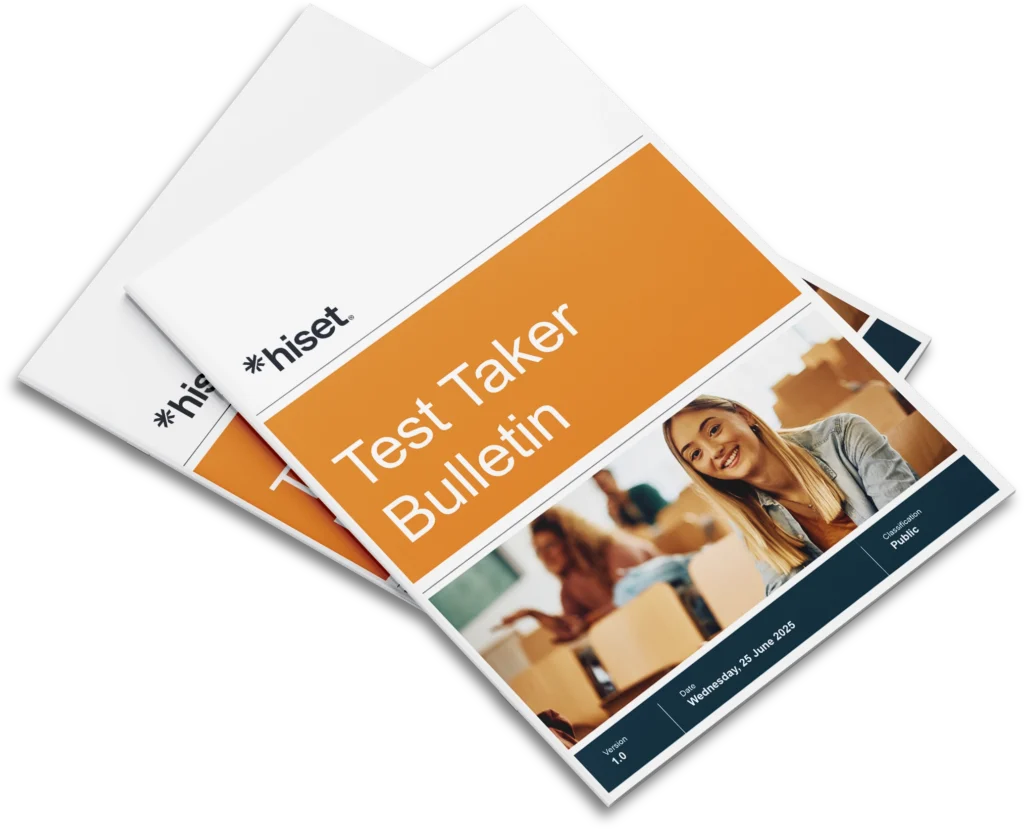Take your test
Information on scheduling and taking the HiSET exam
You’re ready to take the HiSET®
Taking the HiSET exam is an exciting step toward achieving your goals. The days leading up to your test can feel overwhelming, but with the right preparation, you’ll walk in with confidence. Use our test day checklist to make sure you’re ready.
What to expect on the test
Use our Test Taker Toolkit to remind yourself what to expect on the test.
- Review the HiSET Test at a Glance to see how long you have to take your subtest, the number and types of questions, and the content tested.
- Check out sample questions for your test.
- Practice writing your essay by using the Writing Response Scoring Guide and Scored Sample Responses.
- Practice with the free HiSET practice tests.
- See some helpful test taking tips and strategies.
Test day checklist
See answers to frequently asked questions.
Check your test appointment confirmation
Find your test appointment details in your HiSET account or in your confirmation email. Your confirmation details include the test you are taking, the date, start time and how long you have to take your test.
The location of your test will be listed (the test center or as an online proctored test). Your confirmation will also include information about ID requirements, important test day expectations, and cancellation or rescheduling policies.
Contact your Test Center
If you have any questions about your test center location or unique requirements, reach out to the test center before test day. Testing online and not at a test center? Learn more about online proctored HiSET testing policies such as eligibility, location, hardware/software and environment requirements. You can also watch videos to help you know what to expect during the online check in process.
Check state requirements
Some states have specific ID or residency requirements for test day. Be sure to review your state’s policies. Special ID restrictions apply to online proctored tests.
Know the policies, plan ahead
You are not allowed to bring electronic devices, food, or drinks into the test room unless you have an approved accommodation. Most accommodations must be pre-approved – see our testing accommodations page for available options. Some test centers provide lockers for storage, but availability is not guaranteed. Review the HiSET Test Taker Bulletin to better prepare yourself for test day.
Bring these things on test day
Ensure you have the following items when you arrive:
- Valid, acceptable ID
- Approved testing accommodation supplements
- Proof of state-required pretests or other documents (if applicable)
- Payment for test center fees (if applicable)
- It’s also a good idea to bring a copy of your confirmation email for reference.
HiSET exam identification requirements
Your ID must meet all of the following criteria:
- Be an original document (no photocopies)
- Display your full name
- Meet your state’s specific ID requirements
Note: The name on your ID must match exactly the name you used when creating your myHiSET account.
DO NOT bring these things on test day
Items not listed above should be left at home. This includes but is not limited to cell phones, cameras, calculators, writing materials, and unauthorized notes. Unauthorized items in the testing room could lead to cancellation of your test or scores. Test centers provide calculators and any necessary test materials. Other test centers policies may apply.
Know what to expect when you arrive at the Test Center or log in for an online proctored test
You are not allowed to bring electronic devices, food, or drinks into the test room unless you have an approved accommodation. Most accommodations must be pre-approved – see our testing accommodations page for available options. Some test centers provide lockers for storage, but availability is not guaranteed. Review the HiSET Test Taker Bulletin to better prepare yourself for test day.

Everything test takers need to know about HiSET.
Get the full details on the HiSET exam and how to earn your high school equivalency credential in the HiSET Test Taker Bulletin. Download it now to be prepared for test day!